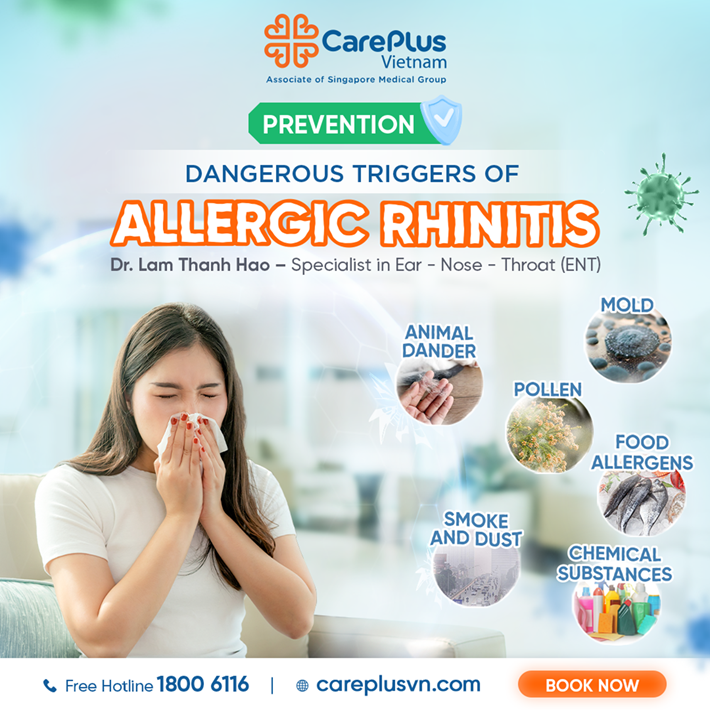PREVENTING DANGEROUS ALLERGENS THAT CAUSE ALLERGIC RHINITIS

6/6/2025 9:51:01 AM
🔔 In recent days, erratic weather changes combined with polluted air in densely populated areas have led to a surge in ENT-related illnesses, particularly Allergic Rhinitis. This condition significantly impacts quality of life.
👉 Let’s explore the information below shared by Dr. Lam Thanh Hao, ENT Specialist at CarePlus International Clinic System, to better understand and prevent this condition.
Common Symptoms of Allergic Rhinitis
Individuals with allergic rhinitis often present with:
- Nasal itching, watery rhinorrhea, and especially frequent sneezing
- Persistent fatigue, headaches
- Snoring or sleep disturbances due to nasal congestion
These symptoms greatly interfere with daily activities, learning, and work performance.
👉 Notably, if left untreated or improperly managed, allergic rhinitis may lead to complications such as sinusitis, otitis media (especially in children), or nasal polyps. So, how can we minimize the discomfort caused by allergic rhinitis?
🔻 Causes of Allergic Rhinitis
Allergic rhinitis is non-contagious. It results from an immune hypersensitivity reaction upon exposure to allergens (both indoor and outdoor). The condition is particularly aggravated during seasonal transitions, especially sudden temperature drops. Common triggers include:
- House dust
- Animal dander (e.g., cats, dogs)
- Mold (especially in humid environments)
- Pollen
- Food and chemicals
- Smoke (incense, charcoal, cigarette smoke)
🔻 Distinguishing Allergic Rhinitis from the Common Cold
Patients with allergic rhinitis typically experience:
- Symptoms triggered or worsened by irritants: changes in weather (rain, cold winds, high humidity), exposure to new climates, air-conditioned rooms, construction sites, dust, cigarette smoke, pollen, or strong odors
- Repetitive sneezing, watery nasal discharge (clear and runny), especially noticeable in the early morning
- Nasal congestion, itching in the nose, eyes, throat, and ears. Severe cases may include red, watery, or irritated eyes
✅ Management and Prevention of Allergic Rhinitis
Treatment is based on three main principles:
1️⃣ Proactive Prevention
- Wear a mask when cleaning or going outside
- Avoid keeping pets (cats, dogs) at home if you are allergy-prone or limit exposure as much as possible
- Regularly change and wash bedding, pillowcases, mattresses, upholstery, etc. Keep living spaces clean and well-ventilated to prevent mold growth.
- Do not smoke and avoid exposure to smoke (cigarettes, incense)
- Avoid consuming foods that have previously caused allergic reactions
- During seasonal changes, especially sudden shifts from hot to cold, allergy-prone individuals should keep warm, wear scarves, maintain proper nutrition, and avoid showering late at night
- Maintain good oral hygiene
2️⃣ Medications (Under Physician’s Guidance)
- Nasal irrigation using saline sprays or specialized rinse bottles as prescribed
- Antihistamines
- Intranasal corticosteroid sprays
3️⃣ Immunotherapy
Indicated when patients do not respond adequately to avoidance measures and pharmacological treatments.
If not properly treated, prolonged allergic rhinitis may lead to:
- Secondary bacterial allergic sinusitis
- Chronic rhinosinusitis
- Nasal polyps
- Otitis media
- Severe asthma
Thus, proactive protection from allergens and timely consultation with an ENT specialist are the best ways to stay healthy, especially during seasonal transitions